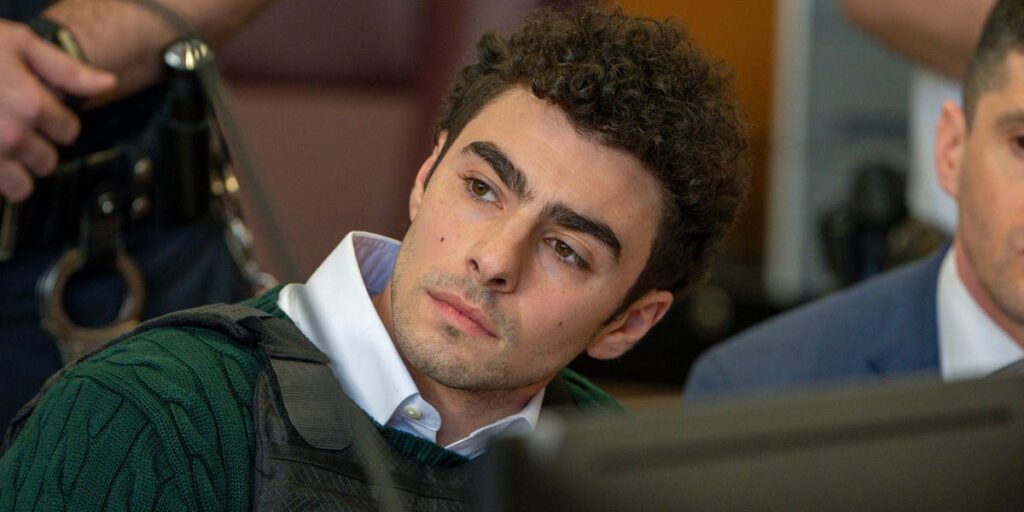September is an important month for Luigi Mangione, the accused killer of UnitedHealthcare CEO Brian Thompson.
Key scheduling and motion decisions will set the stage for all that comes next, both in New York state court, where Mangione, 27, is charged with murder as an act of terrorism, punishable by life in prison, and in federal court, where prosecutors seek the death penalty.
Here are five reasons September is shaping up to be an impactful month in these dual Manhattan prosecutions.
The death penalty
In federal court, Mangione’s defense team, led by Karen Friedman Agnifilo, has a September 19 deadline for filing a motion challenging the constitutionality of the death penalty as sought by government prosecutors.
Mangione’s court-appointed death penalty lawyer, Avraham Moskowitz, wrote in June that the defense has been working on this response since April, when Attorney General Pam Bondi directed New York prosecutors to seek the ultimate punishment.
Prosecutors say there are “aggravating factors” that make Thompson’s murder a death-penalty offense, including the shooting’s substantial planning, the “victim impact,” and the risk of death to others.
Surveillance video from 6:45 a.m. on December 4 shows Thompson, 50, being shot from behind at close range at the entrance to a Midtown hotel where he was due to address an investor conference. The video shows a female bystander standing “only a few feet from Thompson” at the time, with other bystanders “in close proximity,” federal prosecutors noted in court papers last week.
US District Judge Margaret Garnett has yet to rule on a defense request that prosecutors outline the “theories and facts” behind these aggravating factors. Prosecutors wrote last week that they have so far turned over ample evidence — nearly 7 terabytes by the latest defense estimation — and that the law does not require them to tip their hand further until closer to trial.
Who tries Mangione first — NY or the feds
Who will try Mangione first — the state or the feds — is a question that remains contested and unanswered.
At an April arraignment, lead federal prosecutor Dominic Gentile said he expects the state trial will go first, as originally agreed to in December by Manhattan DA Alvin Bragg and Damian Williams, then the outgoing, Biden-appointed US Attorney in Manhattan.
But Mangione’s lawyers want the federal trial to go first. They have asked both judges to delay the state case indefinitely. Garrett, appearing to agree, has told the parties that she intends to set a “firm” 2026 trial date when they reconvene in her courtroom in December.
Still, the state case is simpler — given that the death penalty is not on the table — and it’s further along procedurally. Lead state prosecutor Joel Seidemann has argued that Bragg’s case should go first for those reasons.
Trial order may become clearer at the Baltimore native’s next appearance, scheduled for state court on September 16, when New York Supreme Court Justice Gregory Carro can set a date or step aside and let his federal colleague have first dibs.
A fight over NY’s terrorism case
Mangione’s lawyers are fighting his state murder-as-terrorism indictment on numerous fronts. These efforts, filed in May, challenge the admissibility of evidence and seek the indictment’s dismissal.
Mangione is no terrorist, the defense wrote, arguing that the state’s terrorism charge is designed for crimes that seek to intimidate a larger community.
The defense also argues that the dual, state-federal murder prosecutions “violate the double jeopardy clause and Mr. Mangione’s constitutional rights” because his defense in one case could be used against him in the other.
They also ask that important evidence recovered from Mangione during his December 9 arrest at a McDonalds in Pennsylvania — during what they term to be an improper search — be excluded from his trial. That evidence includes a homemade “ghost gun” that police say matches the crime scene ballistics and a handwritten “manifesto.”
In a June response, Seidemann countered that the evidence was properly seized. It is clear, he also argued that the shooting of Thompson, the head of one of the country’s largest health insurance companies, was an act of terrorism.
In Mangione’s recovered writings, “Defendant rejoiced that he could commit this assassination at the investor conference: he explained that the best way ‘to rebel against the deadly, greed fueled health insurance cartel’ was to ‘wack [sic] the CEO’ at such a conference,” the prosecutor wrote.
The defense dismissal and evidence-suppression motions are due for a decision by Carro at Mangione’s September 16 appearance.
A psychiatric defense — maybe
Carro may also rule on whether Mangione’s lawyers blew the August 25 deadline for announcing that they will seek a psychiatric defense.
The defense has asked for an indefinite extension, again arguing that Mangione’s competing prosecutions are unconstitutional and that the feds traditionally go first.
Seidemann argued in a response filed Thursday that Carro should enforce the deadline and preclude the defense from presenting psychiatric evidence at trial, whenever that may be.
There’s no hard and fast rule that the feds go first, the prosecutor argued, citing as an example the recent upstate New York conviction of Hadi Matar in the attempted murder of author Salman Rushdie. Matar was tried in state court first and still faces federal terrorism charges.
Legal experts have told Business Insider that Mangione’s best chances at avoiding life in prison or the death penalty may be what’s called an extreme emotional disturbance defense. The defense, which could result in a lesser sentence, is available in both state and federal court.
A HIPAA resolution?
Also on the agenda for September 19 is a possible ruling by Carro on what both sides describe as the mistaken disclosure to prosecutors of Mangione’s HIPAA-protected, 120-page Aetna healthcare history.
The defense is demanding a full evidentiary hearing and suppression of the records at trial. Prosecutors oppose, saying there was no ethical breach on their part.
Read the full article here


